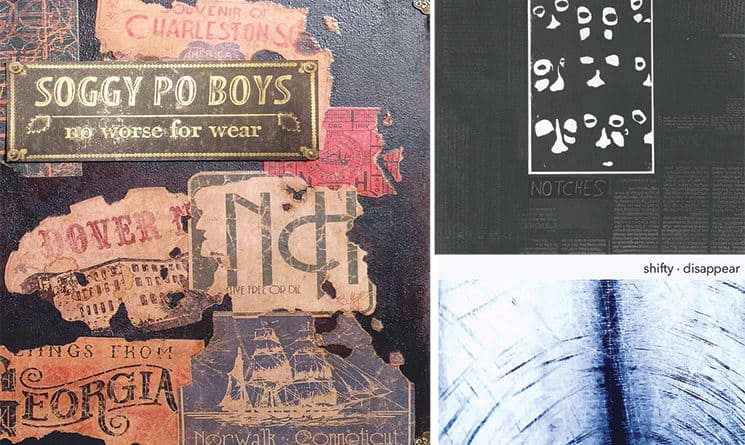“No Worse For Wear” by Soggy Po’ Boys
Self-released
File Under: New Orleans jazz, blues, funk
Sounds like: Sidney Bechet, Tom Waits, Screamin’ Jay Hawkins
When the Soggy Po’ Boys began their collaboration at the Barley Pub in Dover on Mardi Gras in 2012, they embarked on a voyage to explore the diverse sounds of New Orleans jazz. The octet is one of the most talented and accomplished groups in the Seacoast, and they’ve jump-started dance floors and parades across the country. Together, Stu Dias, Eric Klaxton, Colin Mainella, Zach Lange, Nick Mainella, Mike Effenberger, Brett Gallo, and Claude Fried have a distinct swagger that makes the Soggy Po’ Boys a delightfully eccentric cousin to related acts Mother Superior and the Sliding Royales and Tan Vampires.
“No Worse for Wear” is as diverse as the bayou’s fauna — the album soars like egrets, is as thick as cypress roots, gregarious as whistling ducks, and viscous as swampy mud. The Po’ Boys meander through jazz standards, ballads, dirges, tangos, and funky barn-burners and delve into an emotive range from brooding to longing to jubilant and back again. While their previous album, “Perhaps It Is Time to Go Home” was a swinging party, “No Worse” is more intimate, expressive, and grittier. Showcasing a theatrical edge punctuated by Dias’ fantastically booming voice, these songs can be imagined as vibrant scenes out of old-world Americana: a solitary man at the end of the bar, a dancing couple lost in each other’s arms, or a raucous crowd celebrating a new year.
The Po’ Boys hit their stride on slower, somber stand-out tracks like “80 Lives,” “I Never Asked You,” “Come Home,” and “When I’m Gone,” in which Dias channels Tom Waits’ guttural bellows over Fried’s resounding sousaphone and Effenberger’s nimble piano notes. By contrast, the funky powerhouse “Plenty of Time” and the sultry tango “Rose Colored” are as joyously danceable as songs get. Also not to be missed is Gallo’s searing minute-long drum solo on “Hear and Know.”
“No Worse for Wear” is the diverse and carefully-curated story Seacoast audiences have always known the Po’ Boys had in them. It’s a beautifully compelling narrative.
“High Speed Crimes” by Notches
Young Modern Records
File under: pop punk, post punk, power pop
Sounds like: Jawbreaker, Tenement, Garden Variety
The short life cycle of punk-rock bands is full of rapid shifts and fleeting whims. What sets the great bands apart is a slow-burning vexation and time for it to mature. Songwriters and vocalists Ezra Cohen and Zac Mayeaux have been on a fast track since they began playing together in Billy Raygun nearly six years ago, and, along with drummer Dante Guzzardi, they continue to cut their teeth in Charles, Little My, and Betty Nico. As Notches, they wear their sonic influences like proud scars, baring lasting marks that tell the story of how their powerfully melodic sound developed and where it’s going. On their promising debut full-length, “High Speed Crimes,” they’ve already stretched far beyond their years and their influences.
If their first EP, “Huge,” was an ode to Jawbreaker’s “24 Hour Revenge Therapy” and Braid’s “Age of Octeen,” “High Speed Crimes” is a more evolved and dynamic channeling of Tenement’s fearless genre-hopping. Notches are already testing categorical limits as they rip through elements of 1990s pop punk, emo, post punk, and power pop. “High Speed Crimes” is an invitingly familiar yet fresh amalgam, even considering the inherited traits of its punk-rock lineage. Cohen’s increasingly complex songwriting, deft guitar leads, and catchy vocal melodies, combined with Mayeaux’s well-known bravado and a noisier, thicker sound, have filled a void in a genre in which it’s difficult to create a unique identity.
One of many stand-out tracks, “Target Practice,” starts with Mayeaux’s frantically hooky vocal line over Cohen’s arpeggiated chords before exploding into a noisy sonic wall punctuated by their dual vocals. Shifting pace, “Hole” exhibits Cohen’s clean, evocative vocals over slower, grungy power pop, calling out the cool kids amidst choruses of Weezer-inspired “whoa-ohs.” “Going Great” and “The Thing I Can’t Move” are further proof that Notches’ chops are full of pop know-how that belies their youth. “High Speed Crimes” is the first step for a band that’s going to turn the punk world on its ear.
“Disappear” by Shifty
Salty Speakers
File under: post hardcore, space rock, math rock, alternative
Sounds like: Slint, June of 44, Failure
In the current wave of ’90s nostalgia, math rock and space rock are rarely reconsidered. It’s not surprising that when hardcore scene veteran James McHenry enlisted Rick Rude drummer Ryan Harrison and Green Bastard’s Ethan Fortin to revisit this influential period, they were mostly alone in doing so. On their debut full-length, “Disappear,” they more than carry their own weight.
Weaving together several practically indefinable genres makes Shifty hard to peg, but they’re all the better for it. “Disappear” isn’t as noisy or as angular as their math-rock predecessors, or as atmospheric or long-winded as space rock tends to be. McHenry is more purposeful, utilizing discordant elements to amplify the head-nodding clarity when his riffs tighten up and take flight in heavy crescendos. Vocalization has never played a big part in these genres and Shifty skips it altogether, instead employing complex changes, crescendos, powerful breakdowns, and simple, well-written melodies that relinquish the need for a literal component.
The opener, “Glow in the Dark,” finds Shifty at their best, building melodic guitar verses into a minute-long sonic explosion that includes spaced-out effects from Rick Rude’s Noah Lefebvre. “Structures (I Found) in a Dumpster” veers quickly from chunky post-hardcore eruptions to dissonant notes and soaring leads. “Thirsty” is the perfect closer, as Shifty tears down their musical structures in a fury of wails, noise, and a burst of prog-rock changes that abruptly finish the album.
On “Disappear,” McHenry’s genre revitalization efforts chart an auspicious course for Shifty’s brand of alternative instrumentation.

